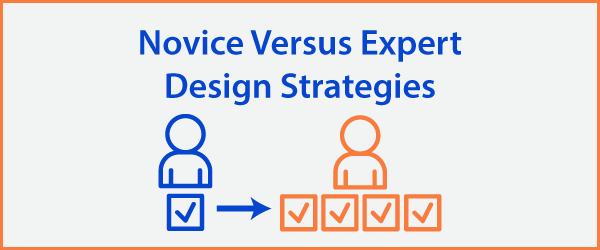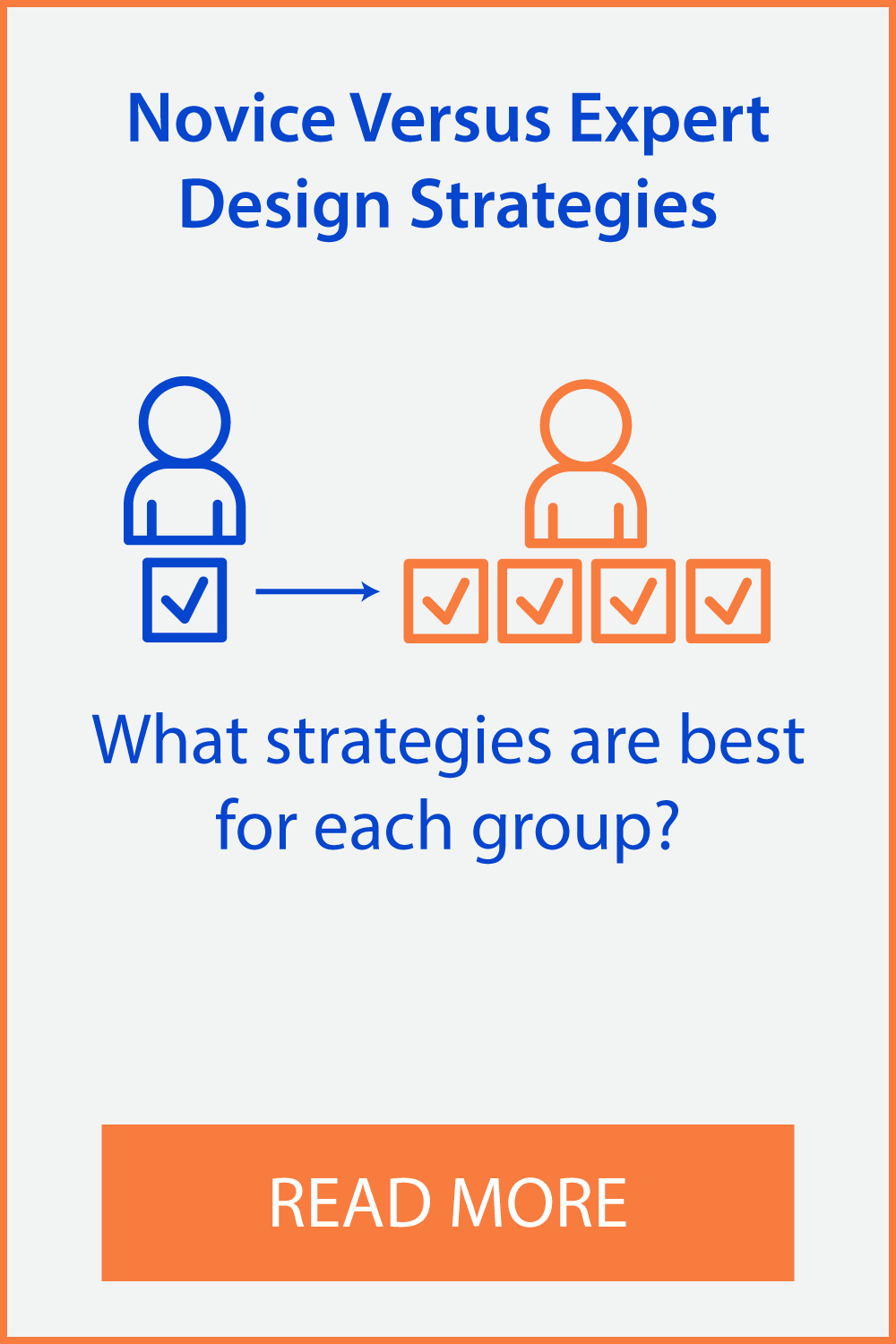
Common sense tells us that we should design differently for novices than for experts. Wouldn’t you expect a novice swimmer to learn new strokes differently than an advanced swimmer? What might not be as obvious, is that learning experiences designed for the novice may have negative effects when used on experts. This is due to a phenomenon known as the expertise reversal effect, also called the prior knowledge principle.
The Expertise Reversal Effect Defined
The basic tenet of the expertise reversal effect is that the effectiveness of instructional methods can change or even reverse as a person gains knowledge and skills. Instructional techniques that are beneficial for beginning learners may be ineffective or detrimental for experienced learners (Kalyuga, et. al., 2003).
For example, it is often effective to provide novice learners with extensive instructional support. In contrast, extensive instructional support may hinder learning for those who are competent in a domain. And providing little support may be more effective.
Effects of High Cognitive Load
According to the theory of cognitive load, the limitations of working memory make it necessary to avoid overloading it. But here’s the catch: what induces high cognitive load in a novice is different than what induces high cognitive load in someone with high prior knowledge. If learners already have acquired information, requiring them to process that information again presents a situation that may lead to increased cognitive load.
Novices Need Extra Guidance
Novices in a domain need sufficient instructional guidance, such as demonstrations of how to work through a problem or task. But this type of approach is often ineffective for advanced learners or even worse, it may interfere with learning. This sounds like an instructional design nightmare!
Why does the expert reversal effect occur?
What is the cause of the expert reversal effect? Several studies demonstrated that for advanced learners, processing the type of redundant information presented to a novice can induce unnecessary cognitive load. It can distract the expert from the new material to be learned.
This is most likely because advanced learners have knowledge structures (schemas) organized for efficiency in the real world. Through study and experience, experts build connections between concepts, principles and practical knowledge. Rather than retaining unrelated sets of isolated facts, expert knowledge appears to be organized in an interrelated network. Their network of knowledge includes both “knowing what” and “knowing how.” See Long-term Memory a User’s Guide for more on schemas.
When experienced learners encounter too much instructional guidance, therefore, they have to stop to integrate and cross-reference this redundant material with their available knowledge structures. This uses up valuable cognitive resources.
Expertise Reversal Effect Design Strategies
What are the implications of the expertise reversal effect? Designers can try to provide adaptive learning experiences that match the competencies of the learner. Experts in a domain should not have to process information they already know. Instead, they should be able to leverage and take advantage of their broad knowledge base. Here are some ways you can design for this:
- Allow learners to show their proficiency in order to point them to the correct level of instruction or to test out.
- Provide digital curation that experts can browse through. See Listen to The Power and Practice of Digital Curation.
- Use a design model that allows for independent exploration.
- Provide support for informal approaches to learning.
- Allow the learner to choose the level at which they want to enter a learning experience.
- Allow participants to self-evaluate their skill level. For example, learners perform a task and then identify the difficulty level of the task. From this information, guide the person to the appropriate level.
Conclusion
Convincing research indicates that optimal instructional methods depend on a learner’s prior knowledge. Where novice learners might need a structured learning experience to build foundation skills, they will benefit from less guidance and more autonomy as they gain expertise. The relative effect of a design strategy is moderated by the learner’s expertise. In summary, the research demonstrates that a fixed and one-size-fits-all approach won’t suffice when designing for a broad audience. To better understand the brain of an expert, see What Makes Someone an Expert? The Cognitive Psychology of Expertise.
References:
- Kalyuga S. (2012) Role of Prior Knowledge in Learning Processes. In: Seel N.M. (eds) Encyclopedia of the Sciences of Learning. Springer, Boston, MA.
- Kalyuga, S (2009). Managing Cognitive Load in ICT-based learning. Journal of Systemics, Cybernetics and Informatics.
- Kalyuga, S., Ayres P., Chandler, P. and J. Sweller (2003). The Expertise Reversal Effect. Educational Psychologist, 38(1), 23–31.
- Kalyuga S. and A. Renkl (2003). Expertise reversal effect and its instructional implications: introduction to the special issue. Instructional Science, 38:209–215.
- Hailikari, T, Katajavuori, N. & S. Lindblom-Ylanne, Relevance of prior knowledge in learning and instructional design. Am J Pharm Educ. 2008 Oct 15; 72(5): 113.
- Sweller, J. et al (2011). Cognitive Load Theory, Explorations in the Learning Sciences, Instructional Systems and Performance Technologies. Springer.


Leave a Reply